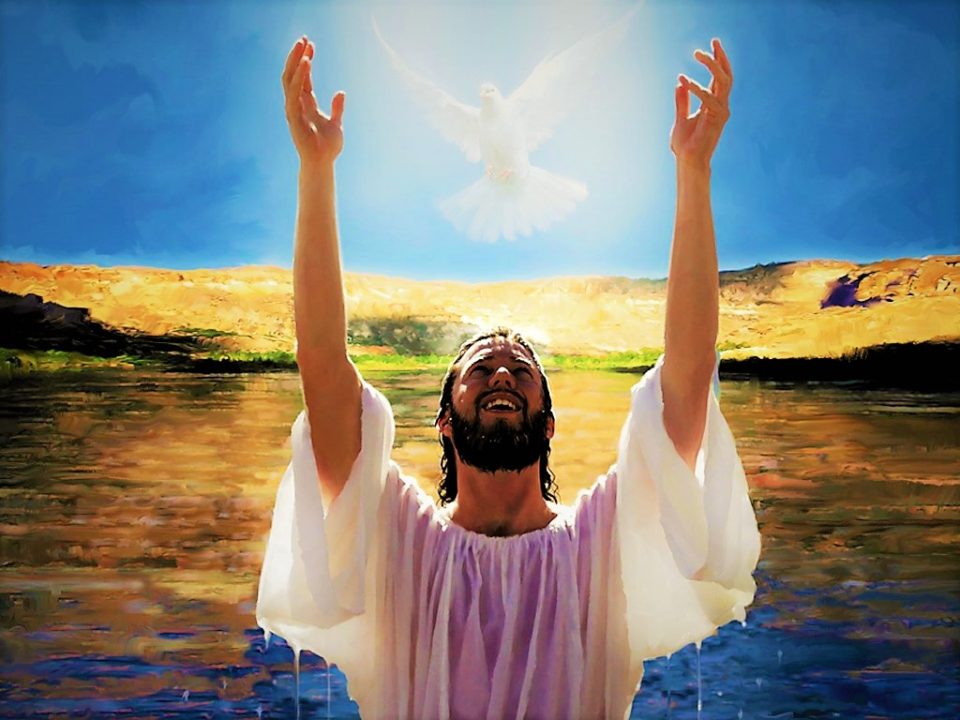DAILY GOSPEL COMMENTARY:
“THE SPIRIT OF THE LORD IS UPON ME” (Lk 4:16-30).

GOSPEL OF MONDAY, 22ND WEEK IN ORDINARY TIME
Lk 4:16–30
Jesus came to Nazareth, where he had grown up, and went according to his custom into the synagogue on the sabbath day. He stood up to read and was handed a scroll of the prophet Isaiah. He unrolled the scroll and found the passage where it was written: The Spirit of the Lord is upon me, because he has anointed me to bring glad tidings to the poor. He has sent me to proclaim liberty to captives and recovery of sight to the blind, to let the oppressed go free, and to proclaim a year acceptable to the Lord.
Rolling up the scroll, he handed it back to the attendant and sat down, and the eyes of all in the synagogue looked intently at him. He said to them, “Today this Scripture passage is fulfilled in your hearing.” And all spoke highly of him and were amazed at the gracious words that came from his mouth. They also asked, “Is this not the son of Joseph?” He said to them, “Surely you will quote me this proverb, ‘Physician, cure yourself,’ and say, ‘Do here in your native place the things that we heard were done in Capernaum.’” And he said, “Amen, I say to you, no prophet is accepted in his own native place. Indeed, I tell you, there were many widows in Israel in the days of Elijah when the sky was closed for three and a half years and a severe famine spread over the entire land. It was to none of these that Elijah was sent, but only to a widow in Zarephath in the land of Sidon. Again, there were many lepers in Israel during the time of Elisha the prophet; yet not one of them was cleansed, but only Naaman the Syrian.” When the people in the synagogue heard this, they were all filled with fury. They rose up, drove him out of the town, and led him to the brow of the hill on which their town had been built, to hurl him down headlong. But he passed through the midst of them and went away.
COMMENTARY FROM THE NAVARRE BIBLE, ST. LUKE (WITH PERMISSION)
- 16-30 For the Jews the sabbath was a day of rest and prayer, as God commanded (Ex 20:8-11). On that day they would gather together to be instructed in Sacred Scripture. At the beginning of this meeting they all recited the Shemá, a summary of the precepts of the Lord, and the “eighteen blessings”. Then a passage was read from the book of the Law — the Pentateuch — and another from the Prophets. The president invited one of those present who was well versed in the Scriptures to address the gathering. Sometimes someone would volunteer and request the honour of being allowed to give this address — as must have happened on this occasion. Jesus avails of this opportunity to instruct the people (cf. Lk 4:16ff), as will his Apostles later on (cf. Acts 13:5, 14, 42, 44; 14:1; etc). The sabbath meeting concluded with the priestly blessing, recited by the president or by a priest if there was one present, to which the people answered “Amen” (cf. Num 6:22ff).
- 18 The Fathers of the Church see this verse as a reference to the three Persons of the Holy Trinity: the Spirit (the Holy Spirit) of the Lord (the Father) is upon me (the Son): cf. Origen, Homily 32. The Holy Spirit dwelt in Christ’s soul from the very moment of the Incarnation, and descended visibly upon him in the form of a dove when he was baptized by John (cf. Lk 3:21-22).
- “Because he has anointed me”: this is a reference to the anointing Jesus received at the moment of his Incarnation, principally through the grace of the hypostatic union. “This anointing of Jesus Christ was not an anointing of the body as in the case of the ancient kings, priests and prophets; rather it was entirely spiritual and divine, because the fullness of the Godhead dwells in him substantially” (St Pius X, Catechism of Christian Doctrine, 77). From this hypostatic union (the fullness of all grace derives. To show this, Jesus Christ is said to have been anointed by the Holy Spirit himself — not just to have received the graces and gifts of the Spirit, like the saints.
- 20-22 Christ’s words in v. 21 show us the authenticity with which he preached and explained the Scriptures: “Today this scripture has been fulfilled in your hearing”. Jesus teaches that this prophecy, like the other main prophecies in the Old Testament, refer to him and find their fulfilment in him (cf. Lk 24:44ff).
- Thus, the Old Testament can be rightly understood only in the light of the New — as the risen Christ showed the Apostles when he opened their minds to understand the Scriptures (cf. Lk 24:45), an understanding which the Holy Spirit perfected on the day of Pentecost (cf. Acts 2:4).
- 22-29 At first the people of Nazareth listened readily to the wisdom of Jesus’ words. But they were very superficial; in their narrow-minded pride they felt hurt that Jesus, their fellow-townsman, had not worked in Nazareth the wonders he had worked elsewhere. They presume they have a special entitlement and they insolently demand that he perform miracles to satisfy their vanity, not to change their hearts.
- In view of their attitude, Jesus performs no miracle (his normal response to lack of faith: cf. for example his meeting with Herod in Lk 23:7-1 1); he actually reproaches them, using two examples taken from the Old Testament (cf. 1 Kings 17:9 and 2 Kings 5:14), which show that one needs to be well-disposed if miracles are to lead to faith. His attitude so wounds their pride that they are ready to kill him. This whole episode is a good lesson about understanding Jesus: we can understand him only if we are humble and are genuinely resolved to make ourselves available to him.
- 30 Jesus does not take flight but withdraws majestically, leaving the crowd paralysed. As on other occasions men do him no harm: it was by God’s decree that he died on a cross (cf. Jn 18:32) when his hour had come.
VIDEO COMMENTARY
TOPIC: WHAT DO YOU DO WITH BASHERS, CRITICS AND THOSE WHO MALIGN YOU?
In today’s gospel reading (Luke 4:14-22), the people who listened to Jesus in the synagogue were impressed with his intelligence and oratorical skills. But they were also doubtful of Him because of His background. “Isn’t he the son of Joseph?” He was a mere carpenter’s son. Soon enough, they would turn against Him. Shades of familiarity breeds contempt. As we reflect on the life of Jesus, we look to ourselves and our own lives. Perhaps, we have been bullied, bashed on social media, have been ignored, regarded unimportant in the lives of people, especially those who matter to us.
Stay updated: subscribe by email for free TO OUR NEW WEBSITE www.catholicsstrivingforholiness.org (PUT YOUR EMAIL IN THE SUBSCRIBE WIDGET).
We are also in www.fb.com/Catholicsstrivingforholiness. Kindly help more people in their Christian life by liking our page and inviting your family, friends and relatives to do so as well. Thanks in advance and God bless you and your loved ones! Fr. Rolly Arjonillo
